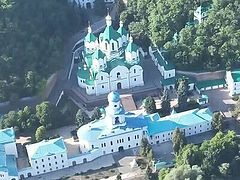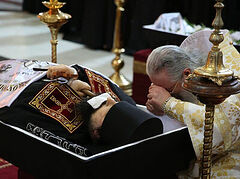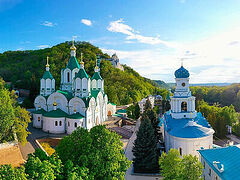The Sviatogorsk Lavra is one of the Orthodox treasures of eastern Ukraine. Situated on the high banks of the Seversky Donets River in the Donetsk region, it was frequented by the future St. John (Maximovitch) of Shanghai and San Francisco, who was born and raised not far from there. It has been housing refugees from the war that started in 2014, when Ukrainian forces began shelling the breakaway republic. With the Russian “special operation” and the Ukrainian army’s response, the Lavra has found itself under fire. In the months of May and June, 2022, due to artillery fire its buildings were damaged, two of its sketes were destroyed, and four monks killed. To honor the heroism and suffering of this famous monastery, we have translated a talk by the abbot, Metropolitan Arseny (Yakovenko) given during more peaceful times.
***
One of the most striking impressions for Orthodox media workers from Ukraine and Russia at the fifth Orthodox Media Festival, which this year [in 2012.—Trans.] took place in the Donetsk region, was a pilgrimage to the Holy Dormition Sviatogorsk Lavra. It would seem that everything was known about the Lavra for a long time, but it prepared many surprises for the forum participants, and everyone will agree that the most impressive one was the communication with the monastery abbot, Archbishop [now Metropolitan] Arseny of Sviatogorsk, Vicar of the Donetsk Diocese. During the talk, which lasted several fascinating hours, Vladyka Arseny impressed everyone with his sincerity, openness and wisdom. Expecting to see a strict father-superior who had managed to turn a ruined monastery into a great Lavra of Ukraine and revive the nearby villages, the Orthodox media reps. unexpectedly beheld an archpastor with a simple view of Divine and earthly things. His stories about Church matters were far from “high style” cold moralizing. Vladyka seemed to be telling a tale, alternating it with local words and popular jokes, with examples of spiritual strength from the Lives of the saints, and funny moments from the life of the brethren and the laity.
On the Lavra and “Sviatogorsk disease”. Twenty years later
True, twenty years is not a very long period. In 1992, the restoration of the ancient monastery, closed in the Soviet era, commenced. Although it began far from the Lavra...
There were only eight of us. When we came here, many fingers were pointed at us that we were a bunch of imbeciles who, at most, would last a couple of months and then scatter. Fr. Tikhon from Lugansk [Hieromonk Tikhon (Ilgov).—Ed.], who is now sitting in the hall, can confirm this.
We had to wash ourselves in the Seversky Donets River, the only shower was in the boiler room of the then sanatorium, and instead of beds we had door panels. It was a time when pilgrims had nowhere to stay; and in fact, the brethren themselves had nowhere to live. And now we can simultaneously accommodate 1,000 people in the Lavra hotels. Since 1859 we had a tradition of providing everything for free.
On his deathbed the first restorer of this monastery, Archimandrite Arseny (Mitrofanov), a spiritual son of the holy elder, Abbot Philaret (Glinsky), left this will and testament: “All pilgrims should be received, accommodated and fed free of charge. As long as you do this, the monastery will not lack anything.” And to this day we do not disobey this blessing; and, glory be to God, everything is still fine...
The town of Sviatogorsk is unique. In the Soviet era it was a resort town with pioneer camps, recreation centers and holiday homes. During perestroika all this was abandoned or destroyed. However, now the recreation centers are experiencing a new lease on life—some spots have been bought out and restored by private entrepreneurs or enterprises (for example, by Stirol the concern of Gorlovka).
If at first people came to us as tourists, then they begin to travel here as spiritual children of our priests. And this happens quite often. Thanks to our monastery many have found new meaning in life or have been healed.
Miracles of healing often occur at the Sviatogorsk Icon of the Mother of God, among which there are many cases of cures from cancer and barrenness. There are many testimonies when families did not have children for eleven to seventeen years, and after prayers at the miracle-working icon they were able to conceive. Parents told their friends about this, and now 15,000 to 20,000 people flock to the icon of the Mother of God for its feast on July 30. As the saying goes, you do not go to an empty well for water.
We could tell you that in such and such a year we restored one thing, and in such and such a year the authorities returned another thing to us. You can see for yourself what has been done. In a nutshell, we can say that when we came here, birch trees grew in the Holy Protection Church, and we removed 2,600 tons of garbage from the Dormition Cathedral. Most importantly, over the twenty years of its recent history the monastery has produced spiritual fathers, whose advice is sought by people from everywhere, and men of prayer for our Holy Orthodox Church, thanks to who tens of thousands of people have become integrated into Church life.
We even have the concept of “Sviatogorsk disease”. In olden times it was said that there was a “Jerusalem disease”: Once a person visits a holy place for the first time, he wants to return there again and again. We have the same here...
The “homestead” Lavra: On schools and children
I call our monastery a “homestead” Lavra, because we have villages and homesteads around us. And schools in villages are comforting for our brethren, since the teachers there are Lavra hieromonks. By the way, this was the case even before the Revolution.
Prior to the Revolution of 1917, the Sviatogorsk Monastery (then there were 800 brethren and seven sketes) built hospitals and schools in all the surrounding villages, where monks were doctors and teachers. The museum has award Gospels given to graduates of the monastic-parochial schools, and they have such signatures as: “The teacher, Monk John”, “The teacher, Monk Eutychius”, etc.
That tradition has been preserved. Three days a week our hieromonks teach in the surrounding villages. But teaching children is a very special task, which requires a special approach. Adults are easier to talk to than children. Children feel the mood of a person and his spiritual state very keenly. You can’t influence children with formality. If your heart is open and you are sincere, then children listen and learn. There is a saying: “Not every priest is a father.”
Unfortunately, there have always been both “performers of rites” and those who have thousands of followers. St. Seraphim of Sarov said, “Save yourself and thousands will be saved around you.” Much depends on the teacher’s personality.
For example, a school in the village of Dolina was going to be closed due to lack of prospects. There was no money in the budget, and it got to the point that in the winter the radiators froze; not a single window remained whole in the gym. During the winter holidays we repaired the heating system, and in the summer we made a major overhaul of the school and arranged free meals in the canteen.
Then we undertook an illegal action (I confess) of paying extra salaries to the teachers who came from the district center to somehow get them interested. A teacher’s salary in Ukraine at present leaves much to be desired. We bought several houses in the village, and converted them into apartments for visiting teachers where they could stay and keep warm. And teachers began to travel there. A fish looks for deeper water, and man for better places.
Since the school is large, we created a nursery with a kindergarten in the unused part of the building. They have a playroom and a lounge there. At the same school an Orthodox children’s Phoenix Theater opened. A local old women’s folk choir was formed. And most importantly, this school—this is neither a gymnasium, nor a lyceum, but an ordinary comprehensive school—has a house church. This is probably the only public school in Ukraine or Russia with a church attached to it. Schoolchildren also read and sing in the choir, and the reader in the school church has been the headmaster for several years now.
But teaching children is not enough; parents need to be taught as well. It happens that in Sunday school children are told something, and they take it close to their hearts. They come home, where the father is not a church-goer, and the mother does not observe the fasts, and the family does not pray. The child tries to pray, but they laugh at him... And you see that the child goes into his shell, and the living bud that took root slowly dies. It is very important that parents be of one mind with their children, otherwise children can learn theory but will not live according to the Gospel. We do not force anyone to take Communion or attend Sunday school classes. Only those who want, come. Moreover, there is always much work in the village, and not everyone has the opportunity to attend a Sunday school.
When visitors come, we ask them, “When do you think the renovation was done in the school?” We normally hear, “Two months ago—everything is fresh and clean.” But, in reality, it was four years ago! No children scratch or write on their desks, which indicates a change in their psychology and attitude to work.
There were cases when someone’s grandmother came up to the headmaster while he was walking to school:
“Oh, Stanislav Sergeevich, thank you very much!”
“What are you thanking me for?”
“For sending some children to dig my garden.”
“But I didn’t send anyone; neither did Fr. Theophan (he teaches there).”
That is, children feel the need to help others.
At the Nativity, children caroled while knocking at people’s doors to collect treats. And on Christmas Eve they went to an orphanage with a Nativity show. They collected full bags through caroling and decided, “Let’s pack it all up and take it to an orphanage.” They themselves took the initiative, packed the gifts up and distributed everything to orphans. And they went back with joy, singing songs, both spiritual and folk songs.
As St. Ambrose of Optina said, “Sow everywhere—on the path, in rocky soil and among the thorns—perhaps something will grow.” This is how we try to do something, little by little.
On the Lavra brethren and an abbot’s prophecy
I’m an optimist. Christians are generally optimists; they believe that they will be in Paradise, and in earthly life they hope for God’s help too. With the help of God we restored almost all the destroyed Lavra sketes and churches. Though now we are not building monastic sketes, but restoring old churches in the villages that were closed and dilapidated, and creating sketes next to them. That is, we are trying to improve the spiritual atmosphere around the Lavra.
When Archimandrite Arseny (Mitrofanov) died in 1859, the brethren elected Archimandrite German (Klitz) as his successor, who is now ranked among the saints. One day he became discouraged. “How will I cope with everything?” he said. “The brethren, thousands of pilgrims, seven sketes, and a huge farm...” The Queen of Heaven appeared to him with St. Nicholas the Wonderworker and St. Herman, Patriarch of Constantinople, Archimandrite German’s patron-saint, and said: “Why are you discouraged, you of little faith? You are not the abbot here—I am the Abbess here. You are a cane in My hand, and everything that you do here is according to My will.”
He served as abbot for thirty-one years, and over that time the monastery was transformed both externally and internally. The Sviatogorsk Monastery was one of the most famous monasteries in the Russian Empire.
In the 1970s, Abbot John (Streltsov) served here; he was famous for his prophecies. Both monastics and laity came to him:
“They say that in 1980 the last priest will be shown on TV, and in 2000 man will achieve immortality.”1
And he would answer:
“Do not worry. Old churches will be restored, and new ones will be built where they never were. The Sviatogorsk Monastery will also open, flourish and become famous.”
“Don’t try to console us, none of this will happen. The Lavra is closed, and the brethren are few.”
“O you of little faith! I say that it will happen! And bells will be heard as far as Krasny Liman!”
His words that the monastery would prosper and become famous came true. When the monastery was given the status of a Lavra, this news reached not only Krasny Liman, but even Jerusalem—the Patriarch of Jerusalem congratulated His Beatitude Metropolitan Vladimir of Kiev and Metropolitan Hilarion of Donetsk.
This is the work of God. Since the Lord takes care of this monastery and the Theotokos called Herself the Abbess, then our task (using this all-powerful help, which disposes the hearts of benefactors to prayer and financial support) is to restore.
I also want to say that not everything depends on the father-superior. I thank the brethren for their active love. Our brethren are good, like one family. We do not have a rule that noble work is for the noble, and the rest is for the novices. Whoever visits the Sviatogorsk Lavra can confirm this. No one shuns any kind of work—both novices and archimandrites plant seedlings.
One novice came to the monastery in 1995 right after graduating from school (then the monastery was still in ruins, and restoration work was just beginning). His mother came to him (he was from a district center and served as a subdeacon in the cathedral) and said, looking at all this:
“Son, why did you come here? There is Pochaev, there is the Pskov-Caves Monastery, there is the Holy Trinity-St. Sergius Lavra—everything in those monasteries is well-established, good and beautiful. Maybe you should move there?
“Mother [she later told me that she hadn’t expected to hear such words from her son.—Auth.], you don’t understand what a joy it is to restore a monastery with your own hands.”
This is the attitude of almost all the brethren towards the monastery. And we value what we have restored, because we have restored it through our own labors.








